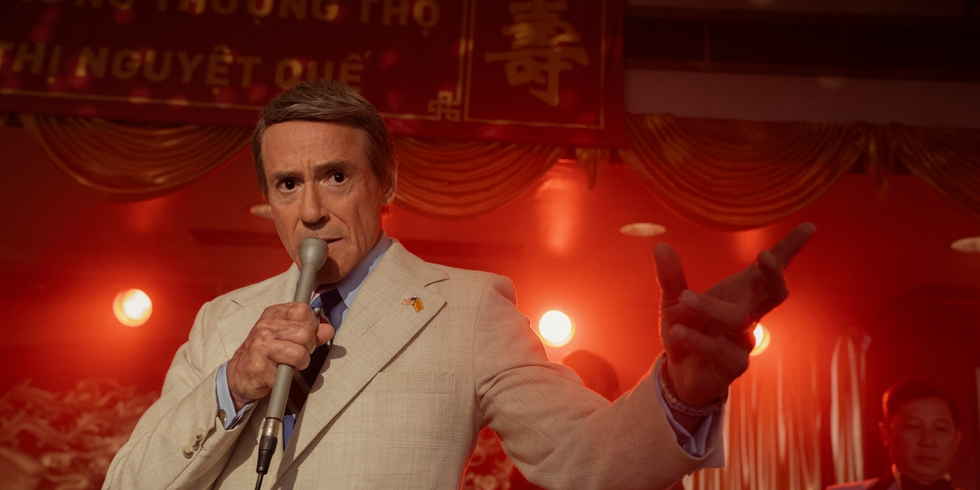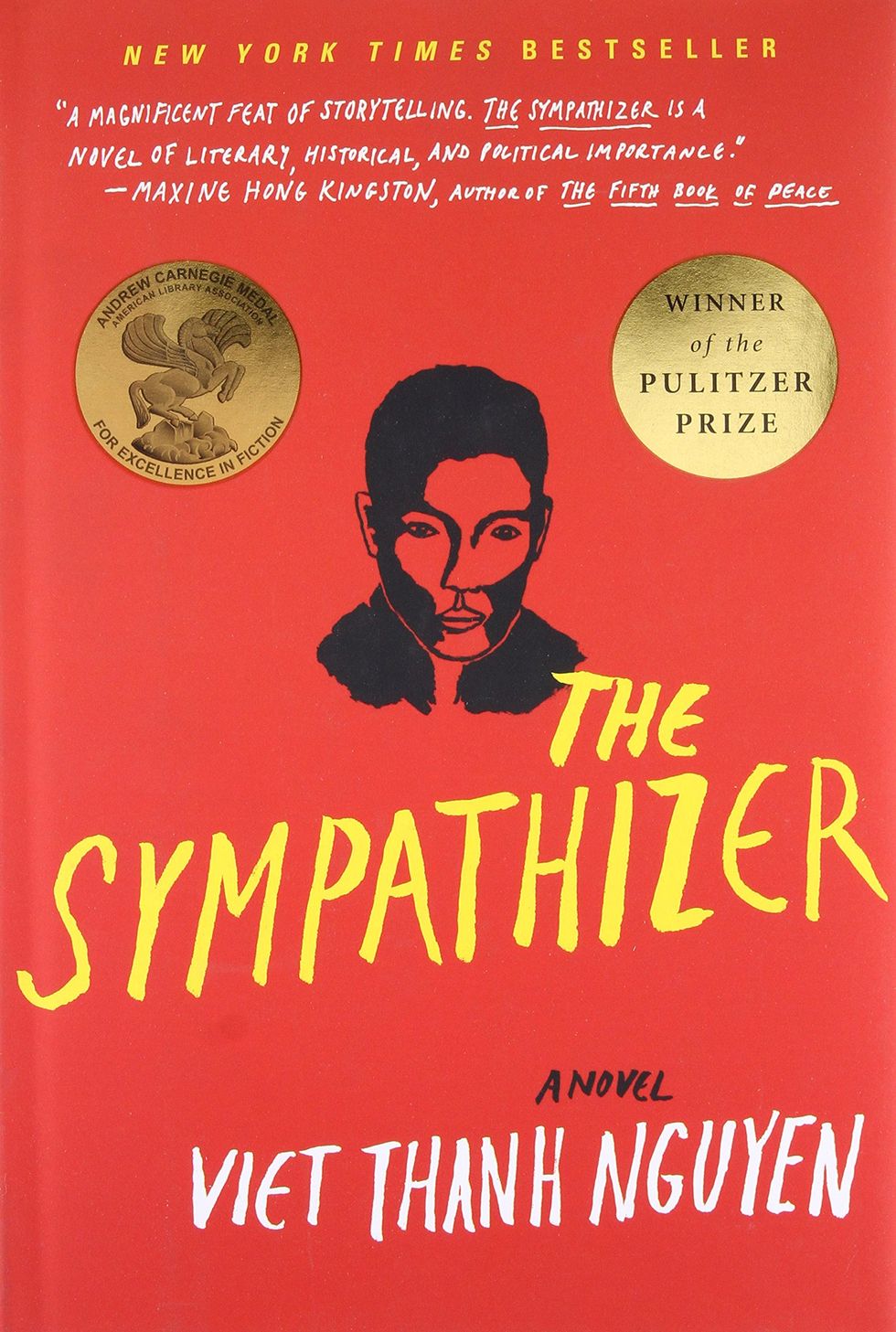A work of fiction may be entirely made up, but the best of it always tells the truth.
That’s precisely the case in The Sympathizer, HBO’s rollicking new Vietnam War miniseries, based on the Pulitzer-winning novel by Viet Thanh Nguyen.
The show, directed by Park Chan-Wook (Oldboy, The Handmaiden) and starring Hoa Xuande and Robert Downey Jr., is told through the confession of an enigmatic double agent torn between his North Vietnamese roots and his American paymasters.
Described as "an espionage thriller and cross-culture satire", it tells the story of The Captain. That's all we ever know him as, a mysterious mole teetering between two worlds: a spy living as an anti-Communist while working for Communists.
He grew up in Vietnam, but went to college in the U.S. He’s a North Vietnamese mole, but also a friend to South Vietnamese soldiers and a CIA agent. He’s a cultural advisor on the filming of an American film, based loosely on Apocalypse Now, but also a political prisoner under a coerced confession. He’s a ghost with two uniforms, and a tangle of contradictions.
The reason we never learn The Captain’s real name is because represents dozens of men and women who lived in the shadows, straddling identities and loyalties during the Vietnam War. He is Nguyen’s attempt to give them a face.
“There really were spies in South Vietnam that rose to the very highest ranks of the South Vietnamese bureaucracy and military,” Nguyen told NPR in 2016.
The 'Anatomy of Spying'
So who were these spies, and how important were they in the Vietnam War?
Nguyen’s main inspiration was a man called Pham Xuan An, a North Vietnamese spy who also worked as a staff writer for Time magazine, Reuters and the New York Herald Tribune during the war.
“During his time as a mole he was promoted to a major general by the North Vietnamese,” said Nguyen. “And he was friends with … all the important American journalists. And they had no idea that he was a communist spy who had studied in the United States.”
In the 1950s, An travelled to California to study at Orange Coast College on scholarship, where he honed his writing at campus newspaper The Barnacle. But back home, war was raging. Upon graduation, he returned to Saigon to live a dual life that became a high-stakes gamble.
By day, he posed as a journalist, writing dispatches for the Western press in Saigon. But by night, he donned a different mask – that of an intelligence officer for the North Vietnamese army.
His colleagues admired his dogged research and legwork. Although he rarely filed stories himself, his remarkable knowledge played a crucial role in virtually every report produced by staff correspondents.
Yet, when TIME’s staff evacuated before the fall of Saigon in 1975, An remained behind. The Telex machine crackled with his voice: “Here is Pham Xuan An now. All American correspondents evacuated because of emergency. The office of TIME is now manned by Pham Xuan An”.
His former colleagues remembered him as a first-class journalist with an easy laugh – An’s son even graduated from the University of North Carolina and Duke Law School with the financial help of some of those correspondents.
Yet An’s story was more intricate. He had been an intellectual chain-smoker who loved dogs and birds, but also a man who vanished for days, leaving no trace. Little did they know, he'd been sneaking off into the infamous Ho Bo woods, some 56km northwest of Saigon, to hand information to his Viet Cong handlers, always under cover of darkness and trees. On other days, he wrote his reports to the Viet Cong in invisible ink and hid them in biscuit tins or cigarette packs, which he passed off to his contact at Saigon’s bustling central market.
An’s espionage tactics were largely self-taught. Fluent in English, he gained knowledge by reading a book titled “Anatomy of Spying” given to him by an American classmate. And ultimately, his ability to navigate both sides of the conflict mirrors the Captain’s struggles in The Sympathizer.
Indeed, An wasn’t the only double agent blurring the lines between truth and lies in the chaos of war.
Codename: ARES
Another was Pham Chuyen, a key double agent for the North Vietnamese whose skulduggery led to the deaths of dozens of CIA operatives.
Born in the crucible of French Colonial North Vietnam, his journey took unexpected turns. Trained as a radio broadcaster, he joined the August Revolution against France. However, his path diverged when he was arrested by the French in 1947. After his release, Chuyen worked for the Quang Yen Security Bureau and later became involved in party activities.
In 1959, as unrest swept through North Vietnam, Chuyen made a fateful decision to flee to the South. There, he caught the attention of the CIA. Recruited in 1961 as part of a five-year infiltration plan, Chuyen returned to the North with a mission: to spy on his homeland under the codename ARES. Little did he know that his mission would take a dark twist.
Upon landing in North Vietnam, Chuyen was swiftly captured by the North Vietnam Public Security Bureau—a powerful and fearsome intelligence service modelled after the Soviet KGB. They manipulated him, turning him into a double agent. From 1961 to 1970, Chuyen’s activities led to the deaths of many CIA and U.S. military personnel. He lured them into traps by requesting new supplies, ultimately compromising nearly all their operations inside North Vietnam.
The Perfume River Squad
Forget the grizzled veterans – history often overlooks the sacrifices of young women. In Hue City, Vietnam, a group of teenagers defied expectations. The "Perfume River Squad," named for the city's aromatic waterway, weren't baggage carriers. These girls, barely out of childhood, were meticulously trained spies.
Disguised as ordinary citizens, they slipped through bustling markets, gathering intel like whispers in the wind. Troop movements, base locations, rumours of civilian morale – every detail was precious to the North Vietnamese commanders. In fact it was their intel that fueled the surprise attack that shook the world: the Tet Offensive. Though a military failure, Tet's psychological impact was immense, eroding American support for the war.
The Perfume River Squad's story highlights the unseen forces that can so often shape history. These young women, through their courage and cunning, played a pivotal role in a pivotal moment. They remind us that the fight for Vietnamese independence wasn't confined to battlefields, but ran through the very heart of everyday life. The Tet Offensive, despite its eventual military failure, had a profound psychological impact, chipping away at American public support for the war.
Indeed, as Pham Xuan An noted before his death, when asked what the biggest mistake the United States had made during the war: “The big mistake the Americans made was not understanding the Vietnamese history, culture, mentality. They were so sure military strength would win the war, they never bothered to learn who they were fighting.”
The Sympathizer will be available to watch in the U.K. on Sky Atlantic and NOW
















